|
|
|
Sort Order |
|
|
|
Items / Page
|
|
|
|
|
|
|
| Srl | Item |
| 1 |
ID:
102945


|
|
|
|
|
| Publication |
2011.
|
| Summary/Abstract |
This paper investigates scientists' roles in the nuclear test ban debate from the 1950s to the achievement of a treaty in 1963. Although guided by the principles of science, scientists approached the test ban debate in many ways. The chemist Linus Pauling attempted to bring morality to bear on U.S. policy, and was smeared as disloyal. Other scientists advocated a test ban from within as government advisors, and from just outside the government as unofficial diplomats at the Pugwash conferences. Although inspired by moral concerns, these scientists found that in order to influence policy they had to uphold, rather than question, the nuclear deterrent. Physicist Edward Teller, meanwhile, sought to cement the link between nuclear weapons and national security. Congressional debate over the Limited Test Ban Treaty revealed that the scientific expertise that scientists relied on to argue for a test ban in the end proved a weakness, as equally credentialed scientists questioned the feasibility and value of a test ban, consequently weakening both the test ban as an arms control measure and scientists' public image as objective experts.
|
|
|
|
|
|
|
|
|
|
|
|
|
|
|
|
| 2 |
ID:
087973
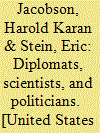

|
|
|
|
|
| Publication |
Ann Arbor, University of Michigan press, 1966.
|
| Description |
ix, 538p.
|
|
|
|
|
|
|
|
|
|
|
|
Copies: C:1/I:0,R:0,Q:0
Circulation
| Accession# | Call# | Current Location | Status | Policy | Location |
| 021866 | 341.734/JAC 021866 | Main | On Shelf | General | |
|
|
|
|
| 3 |
ID:
137817


|
|
|
|
|
| Summary/Abstract |
What accounts for the variation in the influence of scientists in the policy-making process? Why is it that scientists sometimes appear to exercise significant autonomy in shaping policy agendas, while at other times very little? Scientists are most influential, this paper contends, when they can leverage their recognized expertise by strategically co-opting institutionalized channels of advice. This is most likely to occur in issue areas of high complexity and ambiguity when key policy makers are dependent upon scientists for their counsel. Policy entrepreneurs within competing scientific communities, prevented from accessing key decision makers, wait until windows of opportunity open to undermine the credibility of the incumbent experts, gain access to political leaders, and refocus the policy agenda. This theory is developed and tested through a case-study analysis of the nuclear test-ban debate during the Eisenhower administration from 1954 to 1958. The findings of this paper underscore the need to treat foreign policy decision making as a series of strategic interactions between multiple actors with a broader capacity to influence the policy-making process than traditionally conceived. By doing so, scholars can better understand variations in government decision making across time and issue area, providing important insights into the role of experts in a wide range of public policy domains.
|
|
|
|
|
|
|
|
|
|
|
|
|
|
|
|
| 4 |
ID:
125687
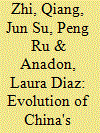

|
|
|
|
|
| Publication |
2013.
|
| Summary/Abstract |
Since 1978, when China launched its "opening up" reform, a range of large-scale national science and technology programs have been implemented to spur economic development. Energy has received significant attention and has become a growing priority in the past years. In this paper we have analyzed the goals, management, and impact over time of China's three largest national programs: Gong Guan, 863, and 973 Programs. Using quantitative metrics to describe the input and output, by conducting semi-structured interviews with officials, scientists, and other decision makers, and by reviewing available documents as well as a case study on the coal sector we examined the changes in the decision making process, particularly in regard to the role of scientists. We found that the changes in strategic priorities set by China's high level political leaders were implemented and then transformed into outputs by using scientists as inputs or policy tools. The decreased role of scientists has been driven by two forces: (1) periodic changes in national strategy emphasizing technology commercialization; and (2) changes in the management structure involving low tolerance of risk. We suggest four ways that the government's efforts to turn China into an innovation oriented country.
|
|
|
|
|
|
|
|
|
|
|
|
|
|
|
|
| 5 |
ID:
103169


|
|
|
| 6 |
ID:
023789
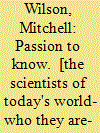

|
|
|
|
|
| Publication |
London, WeidenFeld and Nicolson, 1972.
|
| Description |
xiii, 395p.Hbk
|
| Standard Number |
0297994603
|
|
|
|
|
|
|
|
|
|
|
|
Copies: C:1/I:0,R:0,Q:0
Circulation
| Accession# | Call# | Current Location | Status | Policy | Location |
| 010579 | 925/WIL 010579 | Main | On Shelf | General | |
|
|
|
|
| 7 |
ID:
162858


|
|
|
|
|
| Summary/Abstract |
Americans’ attitudes toward scientists have become more negative in recent years. Although researchers have considered several individual-level factors that might explain this change, little attention has been given to the political actions of scientists themselves. This article considers how March for Science rallies that took place across the United States in late April 2017 influenced Americans’ attitudes toward scientists and the research they produce. An online panel study surveying respondents three days before and two days after the March found that liberals’ and conservatives’ attitudes toward scientists polarized following the March. Liberals’ attitudes toward scientists became more positive whereas conservatives’ attitudes became more negative. However, the March appears to have had little effect on the public’s attitudes about scientific research. In addition to answering questions about the March’s political impact, this research calls attention to the possibility that the political actions of scientists can shape public opinion about them.
|
|
|
|
|
|
|
|
|
|
|
|
|
|
|
|
| 8 |
ID:
152330
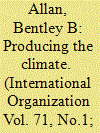

|
|
|
|
|
| Summary/Abstract |
This paper argues that the climate came to take on a geophysical rather than a bioecological form in global governance because it emerged from a dynamic, interactive process between states and scientists. In the 1950s, state agencies, especially elements of the US military, steered and accelerated the development of the geophysical sciences, which set the discursive frame within which climate politics now plays out. In the 1990s, scientists and IO experts responded to states' requests to study carbon sinks by expanding the climate to include new greenhouse gases and land-use practices. Drawing on Science and Technology Studies as well as discursive theories of global governance, I theorize object constitution as a process of co-production in which states steer the development of scientific knowledge and scientists assemble epistemic objects. This contingent interaction of political and scientific actors shapes the form and content of global governance objects. The argument extends and challenges the epistemic communities literature and theories of the global governance life cycle that focus on how problems end up on the agenda of states rather than the processes of problem construction.
|
|
|
|
|
|
|
|
|
|
|
|
|
|
|
|
| 9 |
ID:
097111
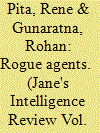

|
|
|
| 10 |
ID:
041418


|
|
|
|
|
| Publication |
New York, The Free press, 1971.
|
| Description |
xiv, 338p.
|
|
|
|
|
|
|
|
|
|
|
|
Copies: C:1/I:0,R:0,Q:0
Circulation
| Accession# | Call# | Current Location | Status | Policy | Location |
| 007404 | 501/SCH 007404 | Main | On Shelf | General | |
|
|
|
|
| 11 |
ID:
108950
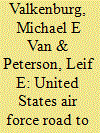

|
|
|
|
|
| Publication |
2011.
|
| Summary/Abstract |
"Bright Horizons" is the United States Air Force's new strategic roadmap for management and development of its military members and civilian employees who are scientists, technologists, engineers, and mathematicians. The roadmap has been approved and signed by the Air Force Chief of Staff and the Secretary of the Air Force and was published in 2011. It has its origins in a 2010 report from the National Research Council titled "Examination of the United States Air Force's Science, Technology, Engineering, and Mathematics (STEM) Workforce Needs in the Future and Its Strategy to Meet Those Needs."
|
|
|
|
|
|
|
|
|
|
|
|
|
|
|
|
|
|
|
|
|